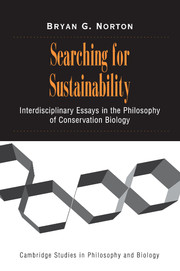Book contents
- Frontmatter
- Contents
- Searching for Sustainability
- General Introduction: An Interdisciplinary Experiment
- I PRAGMATISM AS AN ENVIRONMENTAL PHILOSOPHY
- II SCIENCE, POLICY, AND POLICY SCIENCE
- III ECONOMICS AND ENVIRONMENTAL SUSTAINABILITY
- IV SCALING SUSTAINABILITY: ECOLOGY AS IF HUMANS MATTERED
- V SOME ELEMENTS OF A PHILOSOPHY OF SUSTAINABLE LIVING
- 20 Caring for Nature: A Broader Look at Animal Stewardship
- 21 Can There Be a Universal Earth Ethic? A Reflection on Values for the Proposed Earth Charter
- 22 Intergenerational Equity and Sustainability
- VI VALUING SUSTAINABILITY: TOWARD A MORE COMPREHENSIVE APPROACH TO ENVIRONMENTAL EVALUATION
- Index
22 - Intergenerational Equity and Sustainability
Published online by Cambridge University Press: 21 January 2010
- Frontmatter
- Contents
- Searching for Sustainability
- General Introduction: An Interdisciplinary Experiment
- I PRAGMATISM AS AN ENVIRONMENTAL PHILOSOPHY
- II SCIENCE, POLICY, AND POLICY SCIENCE
- III ECONOMICS AND ENVIRONMENTAL SUSTAINABILITY
- IV SCALING SUSTAINABILITY: ECOLOGY AS IF HUMANS MATTERED
- V SOME ELEMENTS OF A PHILOSOPHY OF SUSTAINABLE LIVING
- 20 Caring for Nature: A Broader Look at Animal Stewardship
- 21 Can There Be a Universal Earth Ethic? A Reflection on Values for the Proposed Earth Charter
- 22 Intergenerational Equity and Sustainability
- VI VALUING SUSTAINABILITY: TOWARD A MORE COMPREHENSIVE APPROACH TO ENVIRONMENTAL EVALUATION
- Index
Summary
INTRODUCTION: WHAT DO WE OWE THE FUTURE?
The concepts of “sustainability” and “sustainable development” have become the central concepts – indeed, shibboleths – in today's environmental policy discussions. This popularity has persisted, despite almost universal complaints – even by those who use them regularly and approvingly – that the concepts are vague and lack consensually accepted meanings. While it seems clear that calls for sustainable activities and policies must rest on an obligation of current people to future generations, philosophers have contributed little to the ongoing policy debates regarding how to define and measure these key terms.
There is of course a significant philosophical literature on the fascinating, and puzzling, subject of the nature of our obligations to the future; the problem is that little attempt has been made to relate the abstract philosophical arguments of the 1970s and 1980s to the more practical problems of stating operational criteria for sustainable living in the 1990s. Especially, philosophers have had little to say about specifying a metric by which progress – or lack thereof – toward sustainability can be measured. Perhaps this is true because philosophical treatments of intergenerational obligation have dealt mainly with a host of puzzles and paradoxes having to do with the inevitable asymmetry of intertemporal moral relationships; in general, attention to these puzzles and paradoxes has not led to a simple and compelling positive theory of intergenerational obligations. Indeed, most philosophical writers have been dismissive of any longer-term obligations, such as obligations that extend beyond one's grandchildren.
- Type
- Chapter
- Information
- Searching for SustainabilityInterdisciplinary Essays in the Philosophy of Conservation Biology, pp. 420 - 456Publisher: Cambridge University PressPrint publication year: 2002



